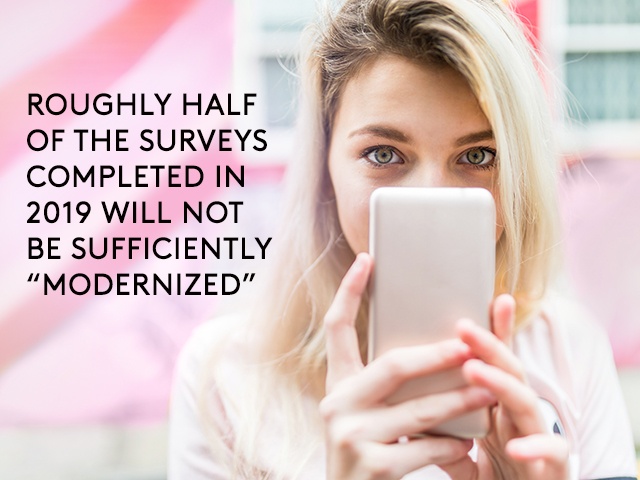2019 was a year of tremendous growth and change for us, where the industry took note and recognised us for our approaches to data quality, innovation, leadership and I&D.
We not only moved to a single brand across Kantar, we also implemented our OnePlatform strategy, launched our API-driven Kantar Profiles Network, and enhanced our offer to provide you with access to insights at the speed of life - all without compromising on quality in an increasingly time-poor and data legislative world.
So, what does this mean for you in 2020?
Read More
Topics:
Digital Data Collection,
Research Quality,
Innovation,
Market Research,
Digital Consumer,
Data Quality,
Consumer Insights,
Ask the Expert
In building the Kantar Profiles Network, we had a clear aim: helping brands and marketers to better understand their audiences. This commitment has been central to the development of our largest single source of respondents to help, simply and securely, connect our clients to trusted data and make informed decisions. But how exactly do we do this?
Here’s just five of the reasons the Kantar Profiles Network helps improve your access to actionable data…
Read More
Topics:
Digital Data Collection,
Research Quality,
Innovation,
Online Sampling,
Market Research,
Digital Consumer,
Marketing Research,
Data Quality,
Panels,
Consumer Insights,
marketing research best practices,
modern surveys,
Sourcing
Today users of research data and insights are regularly – and maybe unwittingly - confronted by a tradeoff between speed, quality and cost whilst juggling the need to move faster with tighter budgets.
Read More
Topics:
Research Quality,
Innovation,
Survey Length,
Survey Design,
Online Sampling,
Market Research,
Data Quality,
marketing research best practices,
Survey Engagement,
modern surveys,
Sourcing
The biggest misconception since the launch of GDPR is the belief the European legislation, published in May 2018, changed the landscape of privacy and security. However, what it actually did was set more stringent checks on the preexisting legal processes and privacy compliance, as well as increase the level of accountability through heftier penalty charges for those noncompliant.
So, how do we manage data and connect data sources safely without fear of handling the personal data of our customers and respondents in a careless manner?
We should start by stating the obvious concept of anonymisation.
Read More
Topics:
Data Driven Marketing,
Privacy,
Data Quality,
MRX Trends,
data enrichment,
marketing research best practices,
data series,
gdpr,
data search
In 2009, the year following the iPhone’s release, eBay conducted $600 million in mobile transactions. Out of the gate eBay’s elegant app minimized friction throughout the acts of buying and selling. Ten years on, market research still struggles to keep pace. Why are links to 30-minute, even one hour plus surveys being emailed to potential respondents? What many refer to as the glacial pace of market research’s migration to mobile is not for lack of trying. Players new and old across the research project service arc have started entire companies, released new products, published parallel test findings and worked diligently to develop tools allowing the process of taking a survey on a smartphone to be as easy as booking a ride on Lyft. Many brand trackers have been redesigned and shortened without any changes to the valuable trend data and normative measures marketers use to make decisions.
Read More
Topics:
Data Quality,
modern surveys
As we know from part 3 of our Marketing Data Integration series, there’s an abundance of data available to marketers, from first-party, to second-party, to third-party. We know we can collect it from a variety of sources and connect these data for a more holistic view of our target customers. What we haven’t discussed yet is the integrity and quality of the mass data at our researching fingertips, or the importance data validation plays in the GDPR world we now live and work in. While only live for a few short months, the guidelines implemented by GDPR have had a significant impact on the digital advertising, consumer insights, and market research industries.
Read More
Topics:
Data Quality,
data series,
gdpr,
validation
We’ve all been there. You spend endless hours perfecting a survey and imagining your ideal audience fallout. Might as well set some quotas to ensure that desired outcome, right? But now, as you take a step back, those quotas are starting to look a bit unrealistic and a little overwhelming. Take a deep breath, because I’m here to help provide solutions for some common pitfalls when it comes to setting quotas.
Read More
Topics:
Online Sampling,
Data Quality
Do I want to know? Yes - you need to know!
Today’s researcher is all about gathering data to create insights that provide guidance and strengthen the core business, future-proofing decision making for their company. In truth that only covers the ‘need-to-know’ part; there is a large share of ‘nice-to-know’ insights as well that are gathered for various reasons (e.g., to verify general thoughts or just to satisfy the board, directors, managers and other influential people within organizations). Need-to-know and Nice-to know insights are both based on data.
Read More
Topics:
Honesty Detector,
Data Quality,
Survey Health Score
Open ended questions generally serve a specific purpose:
- What products/brand/advertisements do you recall?
- You said X, why did you say that?
- Would you purchase/recommend X? Why/why not?
These open-ended questions generate a wider spectrum of codes than the usual standard close-ended questions, especially when the codeframe is kept to a small list, a key aspect in any mobile first survey. However, open-ended questions can also produce less impactful data (sometimes termed as gibberish data) when stock standard question wording is used, as illustrated above. The key to making an open ended question valuable is to frame the question wording to be thought-provoking, making it meaningful for the respondents and making them want to share their views fully, in an environment where this is easy to do.
Read More
Topics:
Data Quality,
Video












